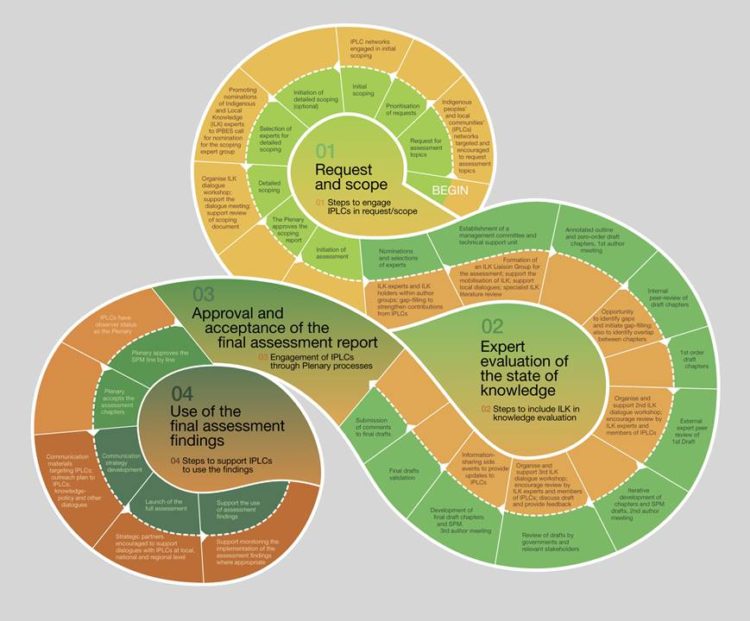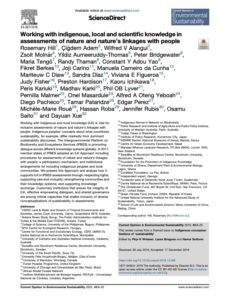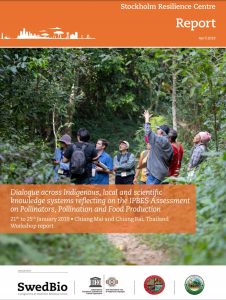 Story highlights
Story highlights
- Senior Advisors Maria Tengö and Pernilla Malmer co-authored a paper about the IPBES ILK Approach, which outlines concepts, practices, and steps for inclusively working across knowledge systems.
- Authors highlighted four key areas for using the ILK Approach: respecting rights; supporting care and mutuality; strengthening IPLC and their knowledge systems; and supporting knowledge exchanges.
- This paper showcases the benefits that are starting to emerge from assessments that adopt an ILK Approach.
Human societies rely on healthy ecosystems. Yet, nature continues to be degraded worldwide. As a way to address this global problem, the Intergovernmental Platform on Biodiversity and Ecosystem Services (IPBES), was established in 2012 as a way to bridge science and policy around the sustainable use of biodiversity and ecosystem services, the benefits people obtain from nature.
As highlighted in the first IPBES global assessment, the knowledge of indigenous peoples and local communities (IPLC) are an important part to the sustainability puzzle across the globe. IPLCs have a major role to play in assessments and policy formulation for biodiversity and ecosystem services. IPBES is committed to recognizing and respecting indigenous and local knowledge (ILK) as part of its assessments. The IPBES governing body adopted the “ILK Approach,” where ILK is recognized and included in IPBES assessments for its important role in protecting biodiversity and promoting human wellbeing.
Senior Advisors Maria Tengö and Pernilla Malmer have been working with the inclusion of ILK in international policy processes, such as in IPBES and the Convention on Biological Diversity (CBD). Recently, the both co-authored a paper about the IPBES ILK Approach. The paper outlines concepts, practices and steps for inclusively working across knowledge systems.
The ILK Approach
ILK has an important part to play in protecting biodiversity and human wellbeing. Tengö explains, “IPBES recognizes that the diverse social, cultural and environmental knowledge of indigenous peoples and local communities (IPLC) contributes extensively to sustainability across large parts of the globe, and thus has a major role to play in assessments and policy formulation for biodiversity and ecosystem services.”
IPBES’ ILK Approach includes three elements:
- Concepts, practices, and steps to undertake IPBES assessments
- Enabling conditions for the inclusion of ILK, including policy support tools and capacity building
- Institutional arrangements, including ways to ensure participation of IPLC
The IPBES also includes three steps for ensuring the inclusion of the ILK Approach:
- Scoping, with steps to engage IPLCs
- Expert Evaluation of the state of knowledge, including ILK knowledge evaluation
- Use the final assessments, including steps to support IPLC to use the findings

Working with the ILK Approach
To ensure that IPLC and ILK are included in assessments, the authors examined the IPBES decision document about the ILK Approach. From 16 sets of practices, they highlighted four key areas of practice for using the ILK Approach:
• Respecting rights – such as free, prior, and informed consent; or building on the UN Declaration on the Rights of Indigenous Peoples.
• Supporting care and mutuality – focuses on: building trust; promoting inclusiveness; acknowledging differences in time frames between knowledge systems; or respecting different forms of engagement, such as rituals or ceremonies.
• Strengthening IPLC and their knowledge systems – For example, promoting activities where ILK is produced, governed, and validated; or ensuring meaningful participation.
• Supporting knowledge exchanges – For example, relies on supporting empowering dialogues as iterative two-way processes.
“The practices in these four categories are not mutually exclusive, but interact and reinforce each other through underlying capacities and challenges,” explains Tengö. They are necessary for ensuring an ILK Approach is met in IPBES assessments, as well as other international policy processes.
SwedBio and ILK Approach
“The diverse elements of the ILK Approach, including recognition of key practices—for respecting rights, supporting care and mutuality, strengthening IPLC and their knowledge systems, as well as supporting knowledge exchanges—and the diverse entry steps into the assessment cycle provide a strong foundation for engaging ILK and IPLC,” Malmer explains.
The paper emphasizes the role of effective empowering dialogue, which is a key approach in SwedBio’s work. The paper also showcases the benefits that are starting to emerge from assessments that adopt an ILK Approach. For instance, the paper highlighted SwedBio’s dialogue workshop on the IPBES pollination assessment with the Karen indigenous people in northern Thailand. The workshop used Multiple Evidence Based (MEB) approach, which has had a significant influence on the development of the ILK approach. The assessment resonated with the Karan indigenous people, as well as identified useful policies about rotational farming systems that were relevant for both local and national governments.
SwedBio is continuing to develop tools and approaches for constructive dialogues that are useful for all actors involved. This includes work that implements and further develops the ILK Approach and the collaborations between knowledge systems in the IPBES.

 Open Access: Working with indigenous, local and scientific knowledge in assessments of nature and nature’s linkages with people
Open Access: Working with indigenous, local and scientific knowledge in assessments of nature and nature’s linkages with people Pollinators dialogue report
Pollinators dialogue report Pernilla Malmer
Pernilla Malmer